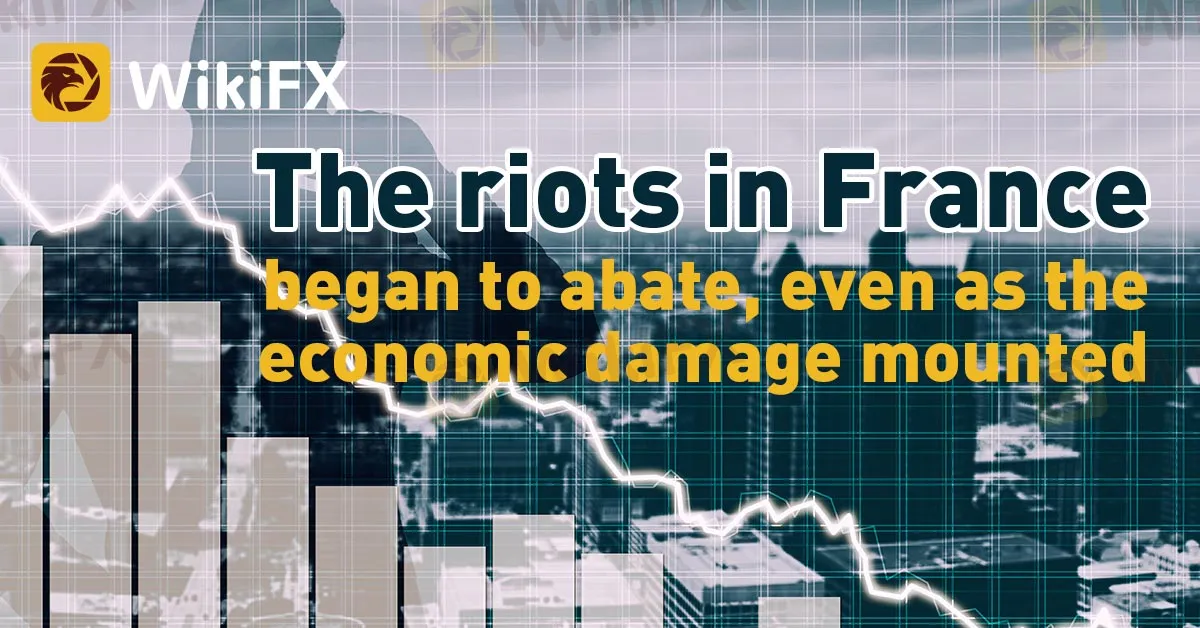简体中文
繁體中文
English
Pусский
日本語
ภาษาไทย
Tiếng Việt
Bahasa Indonesia
Español
हिन्दी
Filippiiniläinen
Français
Deutsch
Português
Türkçe
한국어
العربية
The riots in France began to abate, even as the economic damage mounted
Abstract:Recent riots in France, sparked by the tragic death of a teenager, while the initial days of protests were marked by clashes and looting, there are now indications of the situation gradually stabilizing. However, the economic costs of the unrest continue to mount, adding to the challenges faced by the French government.

Background
Recent riots in France, sparked by the tragic death of a teenager, while the initial days of protests were marked by clashes and looting, there are now indications of the situation gradually stabilizing. However, the economic costs of the unrest continue to mount, adding to the challenges faced by the French government.
Police Reinforcements to Restore Order
In response to the escalating unrest, French authorities deployed additional police reinforcements to quell the violence and restore order. The aim was to prevent further acts of looting, vandalism, and destruction of public and private property.
Economic Costs Mount
While the riots were fueled by social and political grievances, they also took a heavy toll on the French economy. The widespread disruption, including damage to infrastructure and businesses, resulted in significant economic costs. Industries such as retail, tourism, and transportation were particularly affected, leading to financial losses and job insecurity for many. Industries such as retail, tourism, and transportation have been particularly affected, leading to job losses and a decline in investor confidence. The forex market and global stock markets are also impacted negatively. The burden of rebuilding and recovering from the aftermath of the protests adds further strain to an already challenging economic landscape.
Government Response and Mitigation Efforts
Recognizing the severity of the situation, the French government has taken steps to address the concerns of the protestors. It has engaged in dialogues with labor unions, implemented measures to boost employment, and pledged to tackle wealth inequality. These efforts aim to restore social cohesion and alleviate the economic hardships faced by the population.
Global Impact and Lessons Learned
The French riots have not gone unnoticed on the global stage, with other nations closely observing the situation. The unrest has underscored the importance of inclusive economic policies, social welfare, and a responsive government.
Conclusion
While the economic costs of the French riots continue to mount, there are glimmers of hope as the protests begin to abate. The grievances that fueled the unrest remain valid, and there is still much work to be done to address them.

Disclaimer:
The views in this article only represent the author's personal views, and do not constitute investment advice on this platform. This platform does not guarantee the accuracy, completeness and timeliness of the information in the article, and will not be liable for any loss caused by the use of or reliance on the information in the article.
Read more

SocialFi and the Forex Market: A New Era for Decentralized Social Trading?
The worlds of social media and decentralized finance (DeFi) have converged under a new banner—SocialFi. Short for “Social Finance,” SocialFi leverages blockchain technology to reward user engagement, giving individuals direct control over their data and interactions. While SocialFi has primarily emerged in the context of content creation and crypto communities, its principles could soon revolutionize the forex market by reshaping how traders share insights and monetize social influence.

Do This ONE Thing to Transform Your Trading Performance Forever
The story is all too familiar. You start trading with high hopes, make some quick profits, and feel like you've finally cracked the code. But then, just as fast as your gains came, they disappear. Your account balance dwindles, and soon you’re left wondering what went wrong. Worse still, fear and confusion creep in, making every new trade a stressful gamble rather than a calculated decision. If this cycle sounds familiar, you’re not alone.

Check Yourself: Are You Always Rushing for Trades?!
With market fluctuations happening in real-time and profits hinging on split-second decisions, many traders develop an impulse to act quickly. But have you ever stopped to ask yourself: Am I rushing into trades? If you’re constantly clicking “Buy” or “Sell” in a flurry of excitement or anxiety, you may be falling into a dangerous trap that could cost you more than you realise.

How to Avoid Risks from Scam Brokers in Forex Investment?
In recent years, the forex market has become a popular choice for global investors due to its high liquidity and 24-hour trading advantages. However, according to the recently concluded WikiFX "3·15 Forex Rights Protection Day " event, we received over 6,000 pieces of evidence exposing rights violations within a short period. This reflects that, although the forex industry is becoming more regulated, fraudulent platforms continue to emerge, causing significant suffering for many victims.
WikiFX Broker
Latest News
Enlighten Securities Penalized $5 Million as SFC Uncovers Risk Control Failures
Why Are Financial Firms Adopting Stablecoins to Enhance Services and Stability?
Experienced Forex Traders Usually Do This Before Making a Lot of Money
Octa vs XM:Face-Off: A Detailed Comparison
When High Returns Go Wrong: How a Finance Manager Lost RM364,000
Bridging Trust, Exploring Best—WikiEXPO Hong Kong 2025 Wraps Up Spectacularly
Fidelity Investments Explores Stablecoin Innovation in Digital Assets Sector
Interactive Brokers Expands Crypto Trading with Solana, XRP, Cardano, and Dogecoin
SEC Ends Crypto.com Probe, No Action Taken by Regulator
Why More People Are Trading Online Today?
Currency Calculator







